Dolphins and Dugongs - Wildlife Conservation Network (original) (raw)
Sustaining marine mammals for the future of the oceans.
When you support MareCet, you support the first and only Malaysian non-profit organization that is dedicated to the research and conservation of marine mammals locally, including the endangered Irrawaddy dolphin, dugong, Bryde’s whales, and more.
MareCet improves our understanding of marine mammals to conserve the marine environment.
They strive to protect marine mammals and their fragile habitats by providing a platform for local conservation leadership talent, working with stakeholders to optimize conservation outcomes for all involved, and promoting ocean stewardship within society at large in Malaysia.
Marine mammals are renowned for their mystery, intelligence, and beauty.
Unfortunately, many Malaysians today are not aware that whales and dolphins roam the waters right off their coasts.
Increasing our understanding and appreciation of marine mammals.
The name MareCet is derived from the combination of the words Mare, meaning ocean, and Cetacean, for the scientific grouping of whales, dolphins, and porpoises, signifying the two main focuses of the organization: our oceans and marine mammals.
Marine mammals are warm-blooded animals that bear live young and nourish them with milk, as land mammals do, but that spend most or all of their lives in the ocean. Marine mammals play important ecological roles as both predator and prey. Unfortunately, marine mammals in Malaysia are threatened by over-fishing, by-catch, boat traffic, plastic pollution, and noise pollution. MareCet works closely with local authorities and communities to reduce these threats.
A brainchild of Dr. Louisa Ponnampalam and Fairul Izmal Jamal Hisne, MareCet is the first and only non-profit NGO in Malaysia that is dedicated to the research and conservation of marine mammals in Malaysia. Established in 2012 and run by a small yet competent and passionate team of researcher-conservationists, MareCet’s core focuses are increasing scientific knowledge through research, conservation-based outreach and education, strengthening policies, and developing capacity for this field of work.
Marine mammals are renowned for their mystery, intelligence, and beauty.
Unfortunately, many Malaysians today are not aware that whales and dolphins roam the waters right off their coasts.
Increasing our understanding and appreciation of marine mammals.
The name MareCet is derived from the combination of the words Mare, meaning ocean, and Cetacean, for the scientific grouping of whales, dolphins, and porpoises, signifying the two main focuses of the organization: our oceans and marine mammals.
Marine mammals are warm-blooded animals that bear live young and nourish them with milk, as land mammals do, but that spend most or all of their lives in the ocean. Marine mammals play important ecological roles as both predator and prey. Unfortunately, marine mammals in Malaysia are threatened by over-fishing, by-catch, boat traffic, plastic pollution, and noise pollution. MareCet works closely with local authorities and communities to reduce these threats.
A brainchild of Dr. Louisa Ponnampalam and Fairul Izmal Jamal Hisne, MareCet is the first and only non-profit NGO in Malaysia that is dedicated to the research and conservation of marine mammals in Malaysia. Established in 2012 and run by a small yet competent and passionate team of researcher-conservationists, MareCet’s core focuses are increasing scientific knowledge through research, conservation-based outreach and education, strengthening policies, and developing capacity for this field of work.
Conservation Solutions
Reducing Conflict
Dolphins rely immensely on sounds using whistles, squeaks and echolocation, such as clicks, to navigate, communicate and forage. The MareCet team suspects human activities, such as boat traffic increase underwater noise to levels that may be harmful to dolphins. MareCet’s team use hydrophones, underwater audio recording devices, to track dolphins’ sounds in relation to nearby boats. To reduce this noise pollution and conflict between humans and wildlife, MareCet uses their research as evidence to establish Important Marine Mammal Areas to encourage reductions in boat speed or traffic.
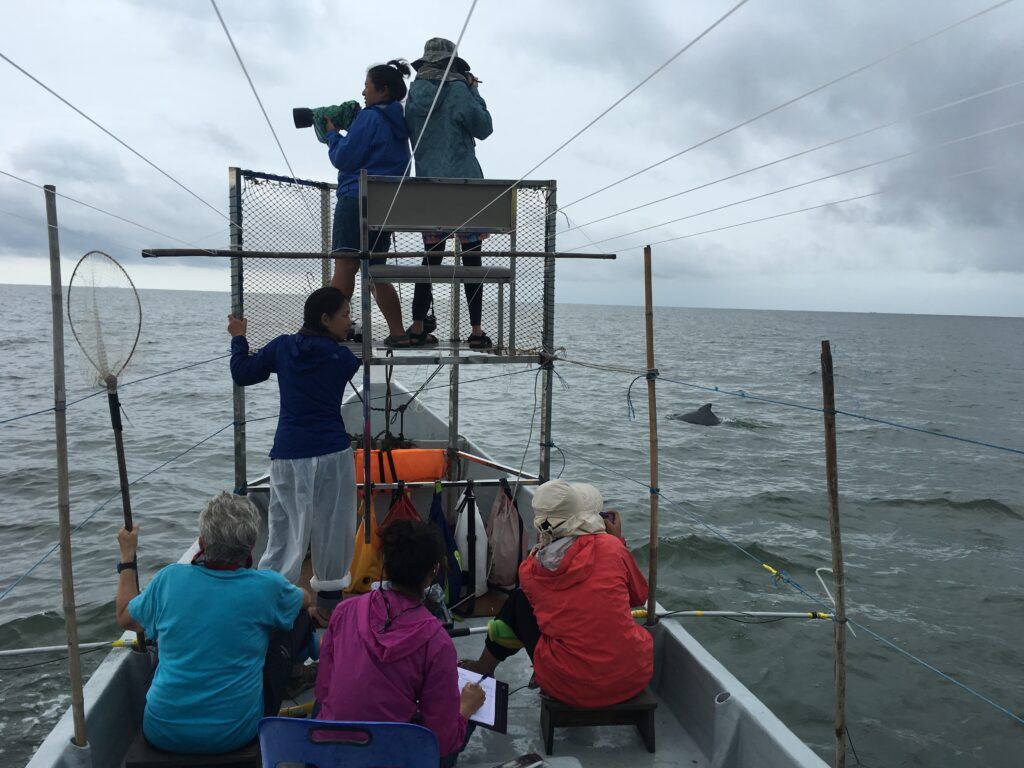
Scientific Research
Scientific research is a core activity of MareCet. They believe that through rigorous research, we can expand our knowledge on marine mammals, and by extension, protection of the marine environment. Their research programs includes population assessments, behavioral studies, genetics, and human-wildlife interactions to improve the understanding of marine mammal distribution, abundance, ranging patterns, social structure, behaviors, and acoustic ecology.
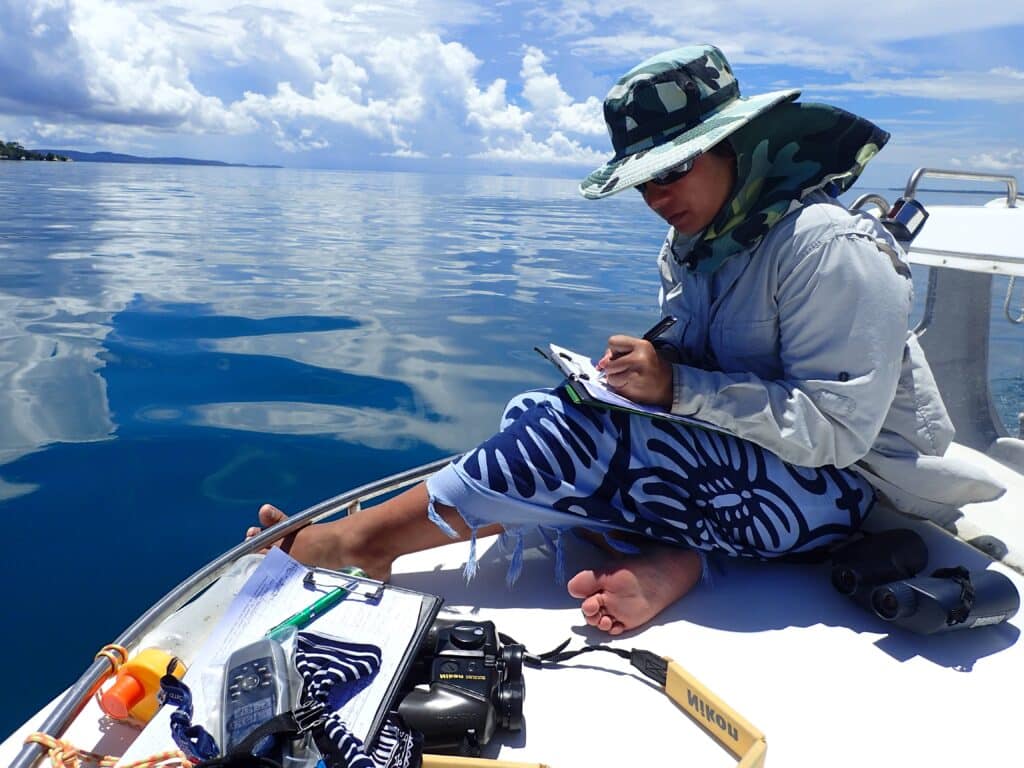
Expanding Education
MareCet believes in the power of education and knowledge transfer as the vehicle to create positive impact and change within society for our natural environment. They ensure that their scientific findings and specialized expertise are translated and shared with a wide audience, which has led MareCet to develop several marine education and outreach programs for local schoolchildren and the general public, such as their Whales On-The-Wheels Marine Education Mobile Event and Sea, Science and Schools Marine Education Program.
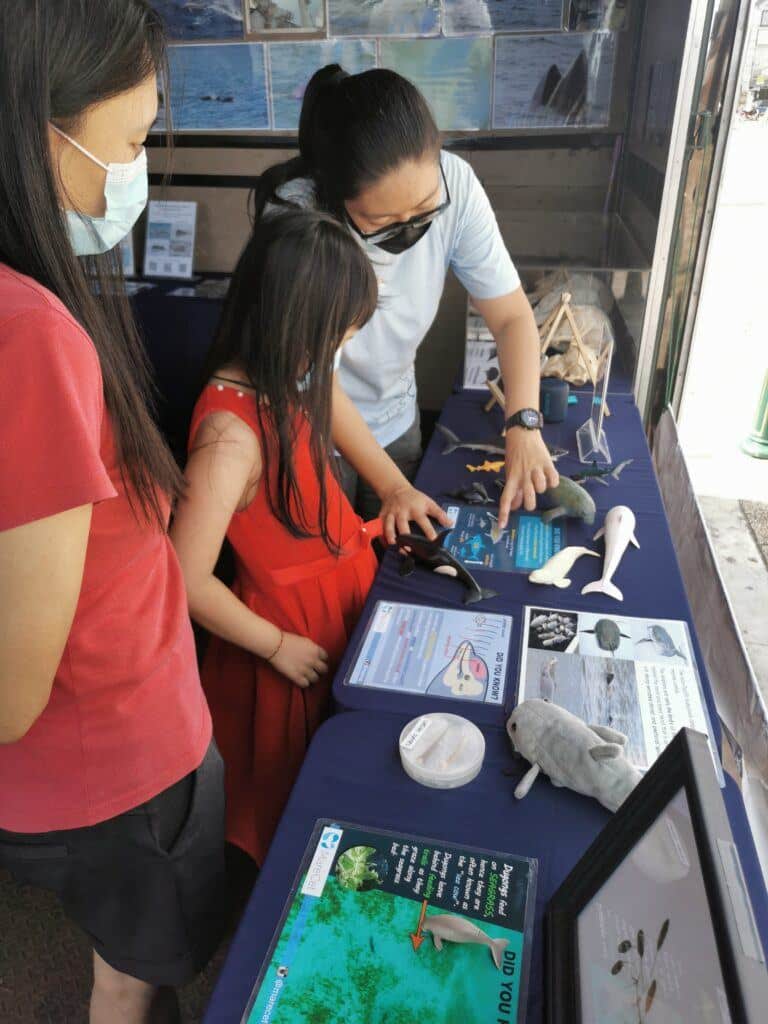
Empowering Women
Dr. Louisa Ponnampalam founded MareCet, not only to pursue the conservation of marine mammals, but also to support the next generation of Malaysian conservationists, especially women, encouraging their team of brilliant women to become leaders in their field. MareCet also supports the livelihoods of Malaysian women through artisan craft projects, to promote cultural traditions native to Malaysia that may be at risk of dying out. Some examples include Mengkuang (screwpine leaves) weaving or Batik, an ancient art form made with wax resistant dye on fabrics.
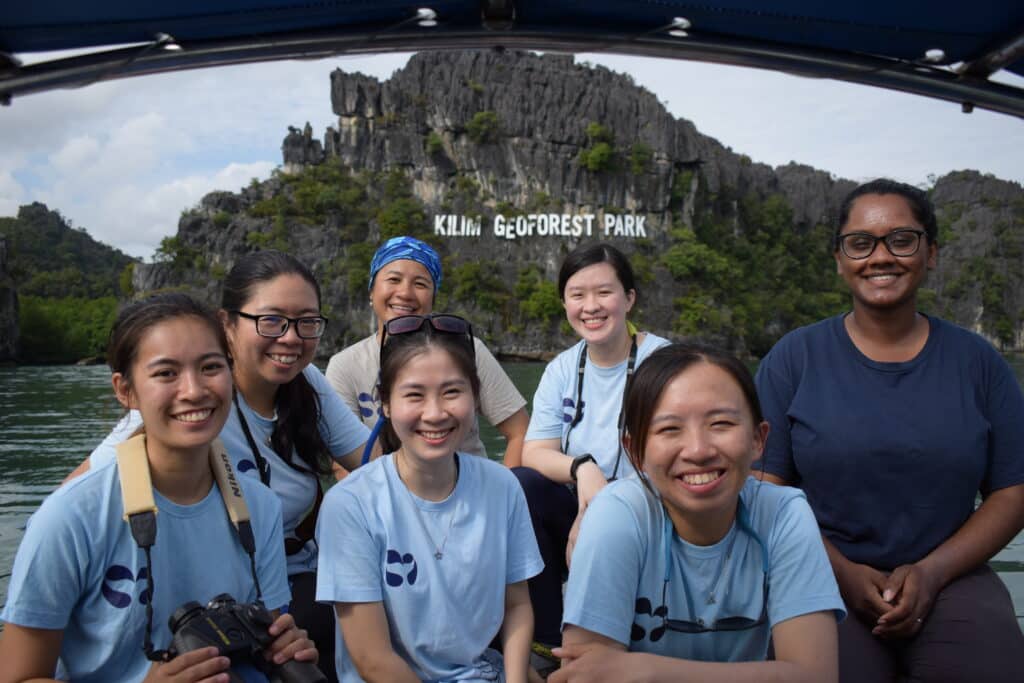
Boosting Local Economies
Marecet sells merchandise items designed by local artists and community members and inspired by some of the dolphins, porpoises and dugongs that they study to support local livelihoods and ongoing conservation efforts. Their Lumbatik bag collection of sarongs and purses are lovingly made locally with Malaysian batik fabric. Lumbatik, derived from the combination of the words “lumba-lumba” (meaning dolphin in the Malay language) and batik, is made in Kuala Perlis, a coastal area on the west coast of Peninsular Malaysia, where Marecet studies and conserves dolphins.
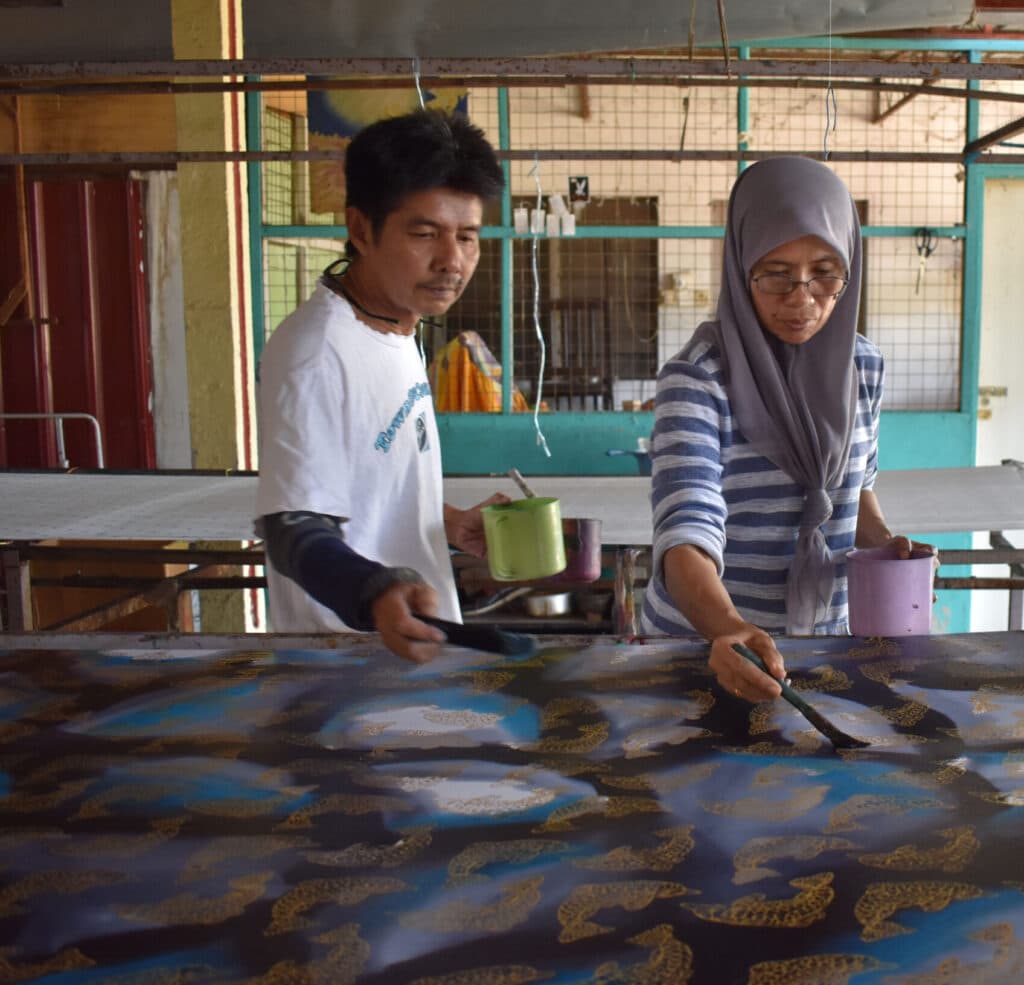
Guiding Policy
MareCet uses science to inform decision-making processes in Malaysia to effect positive changes in how our marine environment is managed, actively advocating for improvements within the environmental policy framework at various levels of governance nationally and at relevant platforms internationally. In recognition of their contributions over the years, MareCet team members have had the honor of being invited to serve in various national and international scientific, conservation, ethics, and other technical committees, including IUCN Species Survival Commission Cetacean and Sirenia Specialist Groups and the National Marine Mammal Stranding Response Network Taskforce.
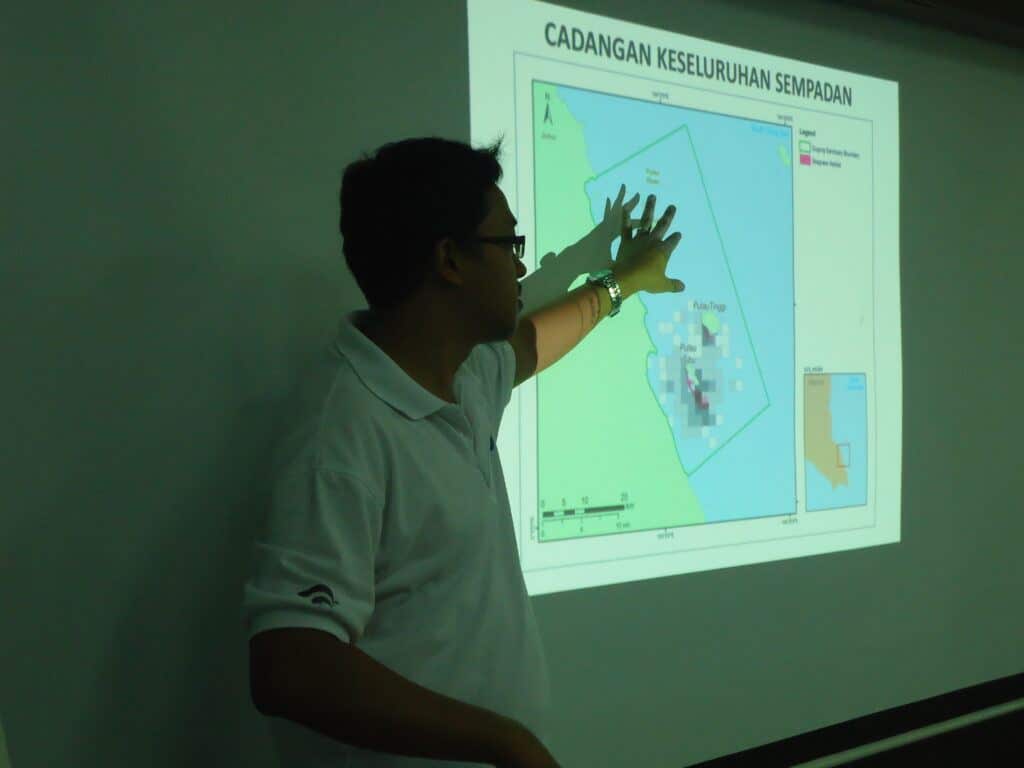
Honoring Culture
Tuba Island is one of four populated islands of Langkawi’s 99-island archipelago, where MareCet works to protect both natural biodiversity and human cultural history. One cultural technique they hope to keep alive is an ancient form of weaving with mengkuang (sea pandanus leaves), handmade locally by women. The mengkuang used for the woven products are harvested and processed on Tuba Island during the hot and dry season, while the weaving of the mengkuang takes place during the wet season. The purchase of these products supports MareCet’s efforts in marine mammal conservation, but also helps to sustain local livelihoods and traditions.
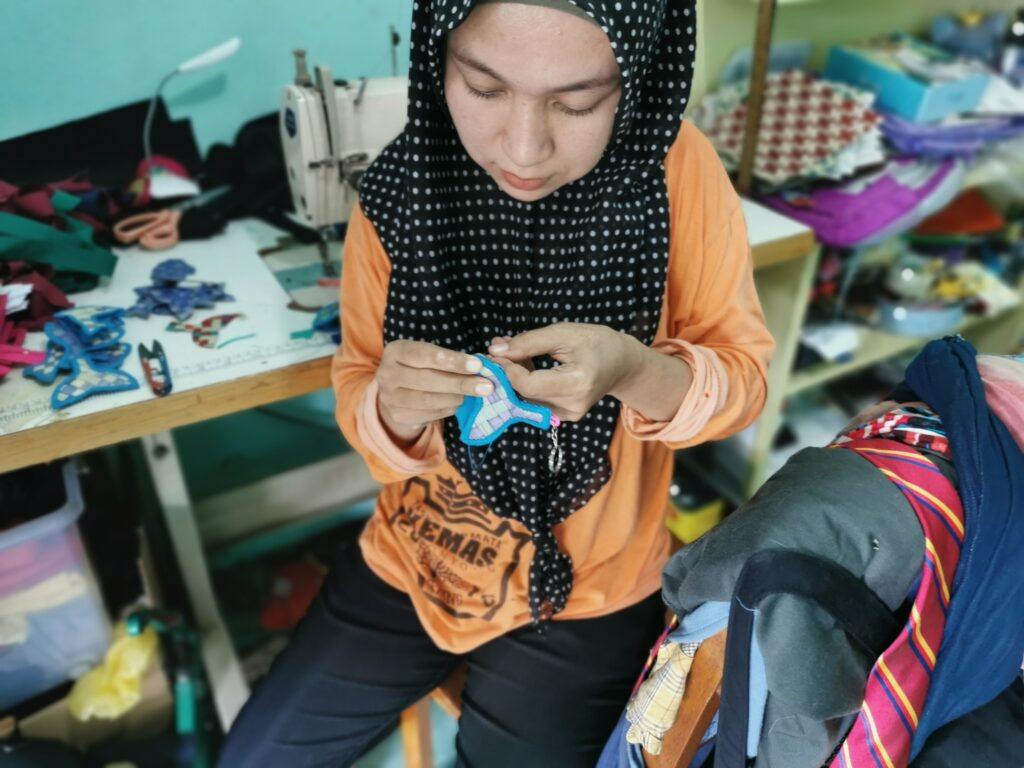
Reducing Conflict
Dolphins rely immensely on sounds using whistles, squeaks and echolocation, such as clicks, to navigate, communicate and forage. The MareCet team suspects human activities, such as boat traffic increase underwater noise to levels that may be harmful to dolphins. MareCet’s team use hydrophones, underwater audio recording devices, to track dolphins’ sounds in relation to nearby boats. To reduce this noise pollution and conflict between humans and wildlife, MareCet uses their research as evidence to establish Important Marine Mammal Areas to encourage reductions in boat speed or traffic.
Scientific Research
Scientific research is a core activity of MareCet. They believe that through rigorous research, we can expand our knowledge on marine mammals, and by extension, protection of the marine environment. Their research programs includes population assessments, behavioral studies, genetics, and human-wildlife interactions to improve the understanding of marine mammal distribution, abundance, ranging patterns, social structure, behaviors, and acoustic ecology.
Expanding Education
MareCet believes in the power of education and knowledge transfer as the vehicle to create positive impact and change within society for our natural environment. They ensure that their scientific findings and specialized expertise are translated and shared with a wide audience, which has led MareCet to develop several marine education and outreach programs for local schoolchildren and the general public, such as their Whales On-The-Wheels Marine Education Mobile Event and Sea, Science and Schools Marine Education Program.
Empowering Women
Dr. Louisa Ponnampalam founded MareCet, not only to pursue the conservation of marine mammals, but also to support the next generation of Malaysian conservationists, especially women, encouraging their team of brilliant women to become leaders in their field. MareCet also supports the livelihoods of Malaysian women through artisan craft projects, to promote cultural traditions native to Malaysia that may be at risk of dying out. Some examples include Mengkuang (screwpine leaves) weaving or Batik, an ancient art form made with wax resistant dye on fabrics.
Boosting Local Economies
Marecet sells merchandise items designed by local artists and community members and inspired by some of the dolphins, porpoises and dugongs that they study to support local livelihoods and ongoing conservation efforts. Their Lumbatik bag collection of sarongs and purses are lovingly made locally with Malaysian batik fabric. Lumbatik, derived from the combination of the words “lumba-lumba” (meaning dolphin in the Malay language) and batik, is made in Kuala Perlis, a coastal area on the west coast of Peninsular Malaysia, where Marecet studies and conserves dolphins.
Guiding Policy
MareCet uses science to inform decision-making processes in Malaysia to effect positive changes in how our marine environment is managed, actively advocating for improvements within the environmental policy framework at various levels of governance nationally and at relevant platforms internationally. In recognition of their contributions over the years, MareCet team members have had the honor of being invited to serve in various national and international scientific, conservation, ethics, and other technical committees, including IUCN Species Survival Commission Cetacean and Sirenia Specialist Groups and the National Marine Mammal Stranding Response Network Taskforce.
Honoring Culture
Tuba Island is one of four populated islands of Langkawi’s 99-island archipelago, where MareCet works to protect both natural biodiversity and human cultural history. One cultural technique they hope to keep alive is an ancient form of weaving with mengkuang (sea pandanus leaves), handmade locally by women. The mengkuang used for the woven products are harvested and processed on Tuba Island during the hot and dry season, while the weaving of the mengkuang takes place during the wet season. The purchase of these products supports MareCet’s efforts in marine mammal conservation, but also helps to sustain local livelihoods and traditions.
You Are Making an Impact for Dolphins and Dugongs
When you get involved, donate, or spread the word on social media, you are truly making a better world for dolphins, dugongs, and the communities that live alongside them. Here’s a few ways you can help:
Connect with MareCet on social media to learn more about their work and be a voice for dolphins and dugongs.
Visit MareCet’s website and sign up for their newsletter to deepen your connection with conservation.
VISIT WEBSITE
You can also help while you shop. Visit MareCet’s merchandise shop.
Donate to support MareCet’s work protecting dolphins and dugongs in the wild. Through our donation model, 100% of your donation goes to field with zero taken for overhead or administration.
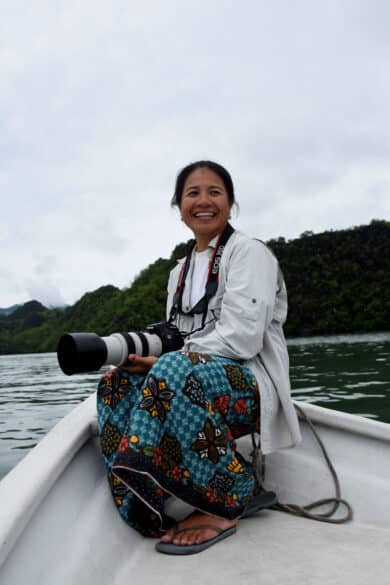
Marine conservation is essential. We have to remember that on our blue planet, the ocean and sea support life. Everyone can be an everyday ocean hero.
Dr. Louisa Ponnampalam, MareCet
Photography Credits: MareCet



